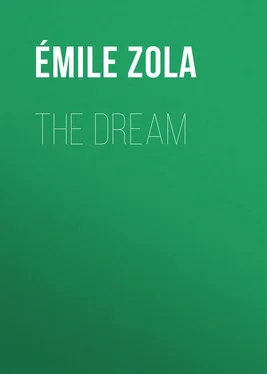Émile Zola - The Dream
Здесь есть возможность читать онлайн «Émile Zola - The Dream» — ознакомительный отрывок электронной книги совершенно бесплатно, а после прочтения отрывка купить полную версию. В некоторых случаях можно слушать аудио, скачать через торрент в формате fb2 и присутствует краткое содержание. Жанр: literature_19, foreign_antique, foreign_prose, на английском языке. Описание произведения, (предисловие) а так же отзывы посетителей доступны на портале библиотеки ЛибКат.
- Название:The Dream
- Автор:
- Жанр:
- Год:неизвестен
- ISBN:нет данных
- Рейтинг книги:3 / 5. Голосов: 1
-
Избранное:Добавить в избранное
- Отзывы:
-
Ваша оценка:
- 60
- 1
- 2
- 3
- 4
- 5
The Dream: краткое содержание, описание и аннотация
Предлагаем к чтению аннотацию, описание, краткое содержание или предисловие (зависит от того, что написал сам автор книги «The Dream»). Если вы не нашли необходимую информацию о книге — напишите в комментариях, мы постараемся отыскать её.
The Dream — читать онлайн ознакомительный отрывок
Ниже представлен текст книги, разбитый по страницам. Система сохранения места последней прочитанной страницы, позволяет с удобством читать онлайн бесплатно книгу «The Dream», без необходимости каждый раз заново искать на чём Вы остановились. Поставьте закладку, и сможете в любой момент перейти на страницу, на которой закончили чтение.
Интервал:
Закладка:
Without thinking, the child still looked at this venerable dwelling of a master-builder, so well preserved, and as she read upon a little yellow plate nailed at the left of the door these words, “Hubert, chasuble maker,” printed in black letters, she was again attracted by the sound of the opening of a shutter. This time it was the blind of the square window of the ground floor. A man in his turn looked out; his face was full, his nose aquiline, his forehead projecting, and his thick short hair already white, although he was scarcely yet five-and-forty. He, too, forgot the air for a moment as he examined her with a sad wrinkle on his great tender mouth. Then she saw him, as he remained standing behind the little greenish-looking panes. He turned, beckoned to someone, and his wife reappeared. How handsome she was! They both stood side by side, looking at her earnestly and sadly.
For four hundred years, the line of Huberts, embroiderers from father to son, had lived in this house. A noted maker of chasubles had built it under Louis XI, another had repaired it under Louis XIV, and the Hubert who now occupied it still embroidered church vestments, as his ancestors had always done. At twenty years of age he had fallen in love with a young girl of sixteen, Hubertine, and so deep was their affection for each other, that when her mother, widow of a magistrate, refused to give her consent to their union, they ran away together and were married. She was remarkably beautiful, and that was their whole romance, their joy, and their misfortune.
When, a year later, she went to the deathbed of her mother, the latter disinherited her and gave her her curse. So affected was she by the terrible scene, that her infant, born soon after, died, and since then it seemed as if, even in her coffin in the cemetery, the willful woman had never pardoned her daughter, for it was, alas! a childless household. After twenty-four years they still mourned the little one they had lost.
Disturbed by their looks, the stranger tried to hide herself behind the pillar of Saint Agnes. She was also annoyed by the movement which now commenced in the street, as the shops were being opened and people began to go out. The Rue des Orfevres, which terminates at the side front of the church, would be almost impassable, blocked in as it is on one side by the house of the Huberts, if the Rue du Soleil, a narrow lane, did not relieve it on the other side by running the whole length of the Cathedral to the great front on the Place du Cloitre. At this hour there were few passers, excepting one or two persons who were on their way to early service, and they looked with surprise at the poor little girl, whom they did not recognise as ever having seen at Beaumont. The slow, persistent fall of snow continued. The cold seemed to increase with the wan daylight, and in the dull thickness of the great white shroud which covered the town one heard, as if from a distance, the sound of voices. But timid, ashamed of her abandonment, as if it were a fault, the child drew still farther back, when suddenly she recognised before her Hubertine, who, having no servant, had gone out to buy bread.
“What are you doing there, little one? Who are you?”
She did not answer, but hid her face. Then she was no longer conscious of suffering; her whole being seemed to have faded away, as if her heart, turned to ice, had stopped beating. When the good lady turned away with a pitying look, she sank down upon her knees completely exhausted, and slipped listlessly into the snow, whose flakes quickly covered her.
And the woman, as she returned with her fresh rolls, seeing that she had fallen, again approached her.
“Look up, my child! You cannot remain here on this doorstep.”
Then Hubert, who had also come out, and was standing near the threshold, took the bread from his wife, and said:
“Take her up and bring her into the house.”
Hubertine did not reply, but, stooping, lifted her in her strong arms. And the child shrank back no longer, but was carried as if inanimate; her teeth closely set, her eyes shut, chilled through and through, and with the lightness of a little bird that had just fallen from its nest.
They went in. Hubert shut the door, while Hubertine, bearing her burden, passed through the front room, which served as a parlour, and where some embroidered bands were spread out for show before the great square window. Then she went into the kitchen, the old servants’ hall, preserved almost intact, with its heavy beams, its flagstone floor mended in a dozen places, and its great fireplace with its stone mantelpiece. On shelves were the utensils, the pots, kettles, and saucepans, that dated back one or two centuries; and the dishes were of old stone, or earthenware, and of pewter. But on the middle of the hearth was a modern cooking-stove, a large cast-iron one, whose copper trimmings were wondrously bright. It was red from heat, and the water was bubbling away in its boiler. A large porringer, filled with coffee-and-milk, was on one corner of it.
“Oh! how much more comfortable it is here than outside,” said Hubert, as he put the bread down on a heavy table of the style of Louis XIII, which was in the centre of the room. “Now, seat this poor little creature near the stove that she may be thawed out!”
Hubertine had already placed the child close to the fire, and they both looked at her as she slowly regained consciousness. As the snow that covered her clothes melted it fell in heavy drops. Through the holes of her great shoes they could see her little bruised feet, whilst the thin woollen dress designed the rigidity of her limbs and her poor body, worn by misery and pain. She had a long attack of nervous trembling, and then opened her frightened eyes with the start of an animal which suddenly awakes from sleep to find itself caught in a snare. Her face seemed to sink away under the silken rag which was tied under her chin. Her right arm appeared to be helpless, for she pressed it so closely to her breast.
“Do not be alarmed, for we will not hurt you. Where did you come from? Who are you?”
But the more she was spoken to the more frightened she became, turning her head as if someone were behind her who would beat her. She examined the kitchen furtively, the flaggings, the beams, and the shining utensils; then her glance passed through the irregular windows which were left in the ancient opening, and she saw the garden clear to the trees by the Bishop’s house, whose white shadows towered above the wall at the end, while at the left, as if astonished at finding itself there, stretched along the whole length of the alley the Cathedral, with its Romanesque windows in the chapels of its apses. And again, from the heat of the stove which began to penetrate her, she had a long attack of shivering, after which she turned her eyes to the floor and remained quiet.
“Do you belong to Beaumont? Who is your father?”
She was so entirely silent that Hubert thought her throat must be too dry to allow her to speak.
Instead of questioning her he said: “We would do much better to give her a cup of coffee as hot as she can drink it.”
That was so reasonable that Hubertine immediately handed her the cup she herself held. Whilst she cut two large slices of bread and buttered them, the child, still mistrustful, continued to shrink back; but her hunger was too great, and soon she ate and drank ravenously. That there need not be a restraint upon her, the husband and wife were silent, and were touched to tears on seeing her little hand tremble to such a degree that at times it was difficult for her to reach her mouth. She made use only of her left hand, for her right arm seemed to be fastened to her chest. When she had finished, she almost broke the cup, which she caught again by an awkward movement of her elbow.
Читать дальшеИнтервал:
Закладка:
Похожие книги на «The Dream»
Представляем Вашему вниманию похожие книги на «The Dream» списком для выбора. Мы отобрали схожую по названию и смыслу литературу в надежде предоставить читателям больше вариантов отыскать новые, интересные, ещё непрочитанные произведения.
Обсуждение, отзывы о книге «The Dream» и просто собственные мнения читателей. Оставьте ваши комментарии, напишите, что Вы думаете о произведении, его смысле или главных героях. Укажите что конкретно понравилось, а что нет, и почему Вы так считаете.












